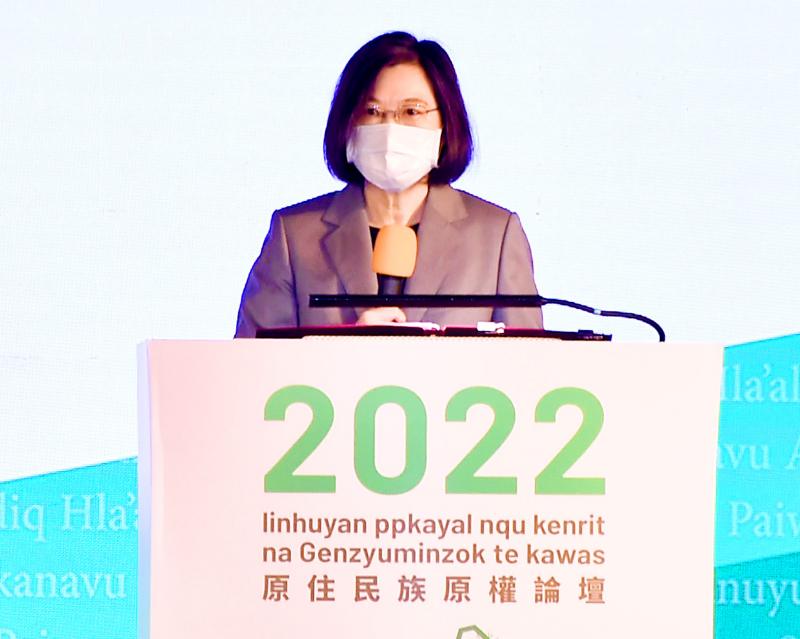President Tsai Ing-wen (蔡英文) yesterday pushed for improvement in indigenous people’s rights to align with global standards, and called on society to respect and learn more from indigenous peoples.
The president was speaking at the opening of this year’s Indigenous Rights Forum held to mark Indigenous Peoples’ Day.
Indigenous rights are deeply connected to the concept of human rights — from the ratification of the UN’s two covenants on human rights to the UN’s Declaration on the Rights of Indigenous Peoples and the Taiwanese government’s promulgation of the Indigenous Peoples Basic Act (原住民族基本法), Tsai said.

Photo: Tu Chien-jung, Taipei Times
“These steps to improve human rights also go toward endorsing and safeguarding the rights of indigenous peoples to their land, language, culture and their group identity,” Tsai told the forum, which was organized by the National Human Rights Commission and the Council of Indigenous Peoples.
She added that six years ago, the Presidential Office set up the Indigenous Historical Justice and Transitional Justice Committee, and two years ago, the Control Yuan launched the National Human Rights Commission to promote transitional justice for indigenous peoples.
Aside from implementing policies for indigenous peoples and protecting their rights, the government is working more to make them “more mainstream” in society, she said.
Resources and mechanisms are now in place to have government meetings hold simultaneous interpretations of indigenous languages, she said.
“The government supports indigenous peoples’ rights to promote their culture, and has established television and radio networks for indigenous peoples,” she said, adding that she has noticed that many young indigenous people are active on YouTube and Instagram, and many have podcasts.
“We wish to see that each year’s August 1 is not just for indigenous peoples, but for all people in Taiwan to mark this day,” she said.
“Our society should pay respect to and to learn from indigenous peoples,” she said.
Separately, Australian Representative to Taiwan Jenny Bloomfield also marked the occasion with a video post on the Facebook page of the Australian Office in Taipei on Sunday.
“Australia and Taiwan have worked even closer together over recent years to strengthen exchanges between our indigenous peoples and communities,” she said in the video.
In a statement yesterday, she said that “indigenous cultures, languages, histories and traditions are a vital part of who we are — and they form a special bond between Australia and Taiwan.”
“Today, we are proud to join with you as you celebrate the history, culture and achievements of Taiwan’s Indigenous peoples. We will continue to work together to promote opportunities for Indigenous peoples everywhere; to ensure that the rights and traditions of Indigenous peoples are respected; and that all Indigenous peoples are full participants and beneficiaries of a free, open and fairer world,” it said.

‘DENIAL DEFENSE’: The US would increase its military presence with uncrewed ships, and submarines, while boosting defense in the Indo-Pacific, a Pete Hegseth memo said The US is reorienting its military strategy to focus primarily on deterring a potential Chinese invasion of Taiwan, a memo signed by US Secretary of Defense Pete Hegseth showed. The memo also called on Taiwan to increase its defense spending. The document, known as the “Interim National Defense Strategic Guidance,” was distributed this month and detailed the national defense plans of US President Donald Trump’s administration, an article in the Washington Post said on Saturday. It outlines how the US can prepare for a potential war with China and defend itself from threats in the “near abroad,” including Greenland and the Panama

The Chinese Nationalist Party (KMT) is maintaining close ties with Beijing, the Democratic Progressive Party (DPP) said yesterday, hours after a new round of Chinese military drills in the Taiwan Strait began. Political parties in a democracy have a responsibility to be loyal to the nation and defend its sovereignty, DPP spokesman Justin Wu (吳崢) told a news conference in Taipei. His comments came hours after Beijing announced via Chinese state media that the Chinese People’s Liberation Army’s Eastern Theater Command was holding large-scale drills simulating a multi-pronged attack on Taiwan. Contrary to the KMT’s claims that it is staunchly anti-communist, KMT Deputy

RESPONSE: The government would investigate incidents of Taiwanese entertainers in China promoting CCP propaganda online in contravention of the law, the source said Taiwanese entertainers living in China who are found to have contravened cross-strait regulations or collaborated with the Chinese Communist Party (CCP) could be subject to fines, a source said on Sunday. Several Taiwanese entertainers have posted on the social media platform Sina Weibo saying that Taiwan “must be returned” to China, and sharing news articles from Chinese state media. In response, the Mainland Affairs Council (MAC) has asked the Ministry of Culture to investigate whether the entertainers had contravened any laws, and asked for them to be questioned upon their return to Taiwan, an official familiar with the matter said. To curb repeated

Myanmar has turned down an offer of assistance from Taiwanese search-and-rescue teams after a magnitude 7.7 earthquake struck the nation on Friday last week, saying other international aid is sufficient, the National Fire Agency said yesterday. More than 1,700 have been killed and 3,400 injured in the quake that struck near the central Myanmar city of Mandalay early on Friday afternoon, followed minutes later by a magnitude 6.7 aftershock. Worldwide, 13 international search-and-rescue teams have been deployed, with another 13 teams mobilizing, the agency said. Taiwan’s search-and-rescue teams were on standby, but have since been told to stand down, as